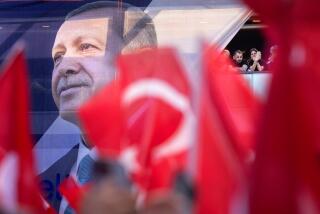Turks Become Key Players in Confrontation
- Share via
WASHINGTON — Throughout the Cold War and over nearly half a century of Middle East crises, Turkey has lived on the cutting edge between East and West. Now, Saddam Hussein’s rampage into Kuwait has made President Turgut Ozal’s government in Ankara a key player in the first great post-Cold War confrontation.
More than half of Iraq’s oil exports reach the Mediterranean Sea in an 815-mile-long pipeline through Turkish territory. Operation of the line brings Turkey more than $200 million a year.
At the same time, the Turks provide a healthy portion of Iraq’s critical food imports. In fact, Turkish food imports, as much as anything, made it possible for Iraq to persevere in its eight-year-long war with Iran.
Altogether, trade between the two nations is estimated at nearly $3 billion a year.
If the U.S.-led effort to isolate Baghdad escalates into a quarantine on movement of Iraqi oil, the Turkish Mediterranean port of Iskenderun is one of two places where the spigot would have to be closed.
Also, if an Iraqi move on Saudi Arabian oil fields were to produce an American decision to retaliate with bombers, Turkish bases could become crucial to those operations.
In the last two days, President Bush has spoken with Ozal at least twice, and Sunday the deputy prime minister of Iraq paid a four-hour visit to the Turkish capital to discuss the crisis with the Turkish president.
The few public utterances by Ozal show that he is trying to follow an excruciatingly delicate course between his Islamic neighbor and economic partner, on the one hand, and his allies in the North Atlantic Treaty Organization, on the other.
After the meeting with the Iraqi emissary, Ozal’s office issued a statement urging Iraq to take a “realistic and constructive” course. This came only after the Turkish leader had indicated that it would be out of the question for him to close the Iraqi pipeline.
Turkey, like all neighbors of the militarily powerful Iraq, also must weigh the possibility of retaliation if it takes an active role in thwarting Iraq. Iraq’s deputy prime minister, after meeting with Ozal, warned that anyone who opposes Iraq will be “the loser.”
Still, many Middle East observers believe that Turkey if forced to choose, would cast its lot with the West.
Although relations with Iraq have been extensive, they have not always been cordial.
For example, the two countries, whose governments share problems with Kurdish rebels, have not agreed on the means of dealing with them. Turkey did not approve when Hussein used deadly chemical gas on the Kurds in 1988.
And over the years, Turkey “has always felt mildly uneasy about Iraq’s revolutionary ideology,” said Graham Fuller, senior political scientist at the Santa Monica-based Rand Corp.
“It would be very hard right now to predict just how Turkey will respond,” Fuller said. “They want to be helpful to the West because they look West, think West and want to be included in Western calculations. But they will not want to pay a uniquely high price.”
In the days ahead, Fuller said, he expects the Turkish government to carefully assess the solidarity of the Western community in efforts to isolate Hussein and to watch development of Saudi responses to issues such as the possible closing of the Iraqi pipeline.
But despite the heavy Western interest, the possibility of a break with Iraq is a traumatic prospect for Turkey, not only because of economic interests but because of their Islamic brotherhood and their proximity in the Middle East.
Turkey’s close ties with the West have their roots in the 1920s, when Kemal Ataturk established the modern secular Turkish state. The relations have been cemented by the Turks’ fears of the Soviet Union and its 40-year partnership with NATO.
Yet, the country retains an Islamic character, which makes any decision to choose sides in Middle East politics a grave concern for politicians. It is an especially difficult decision in the present crisis, for Turkey has seen signs of resurgent Islamic fundamentalism in its own schools and in government ministries.
Hussein’s aggression comes at an especially difficult moment for the Turks. Seeing a decline of NATO in reaction to the collapse of communism, the Ankara government has hoped to make membership in the European Community its new anchor in the West. But its admittance has been indefinitely delayed.
Chronic economic problems have been aggravated by the opening of Eastern Europe because Turkish migrant workers have been replaced by Eastern Europeans, sending jobless Turks home by the tens of thousands.
But Ozal, who came to power after a period of anarchy and military rule in the 1970s, has skillfully dominated the country’s politics for much of the 1980s, finally bringing to Turkey a free market economy.
Although Ozal said he has had no request from the United States to close the pipeline, the appearance of the Iraqi government official in Ankara on Sunday indicated a concern in Baghdad over the role that Turkey will play.
In addition to using the pipeline, which cuts across Turkey from Iraq to the Mediterranean, Hussein sends tanker trucks to Turkish refineries every day, adding to the Turks’ revenue.
More to Read
Sign up for Essential California
The most important California stories and recommendations in your inbox every morning.
You may occasionally receive promotional content from the Los Angeles Times.













